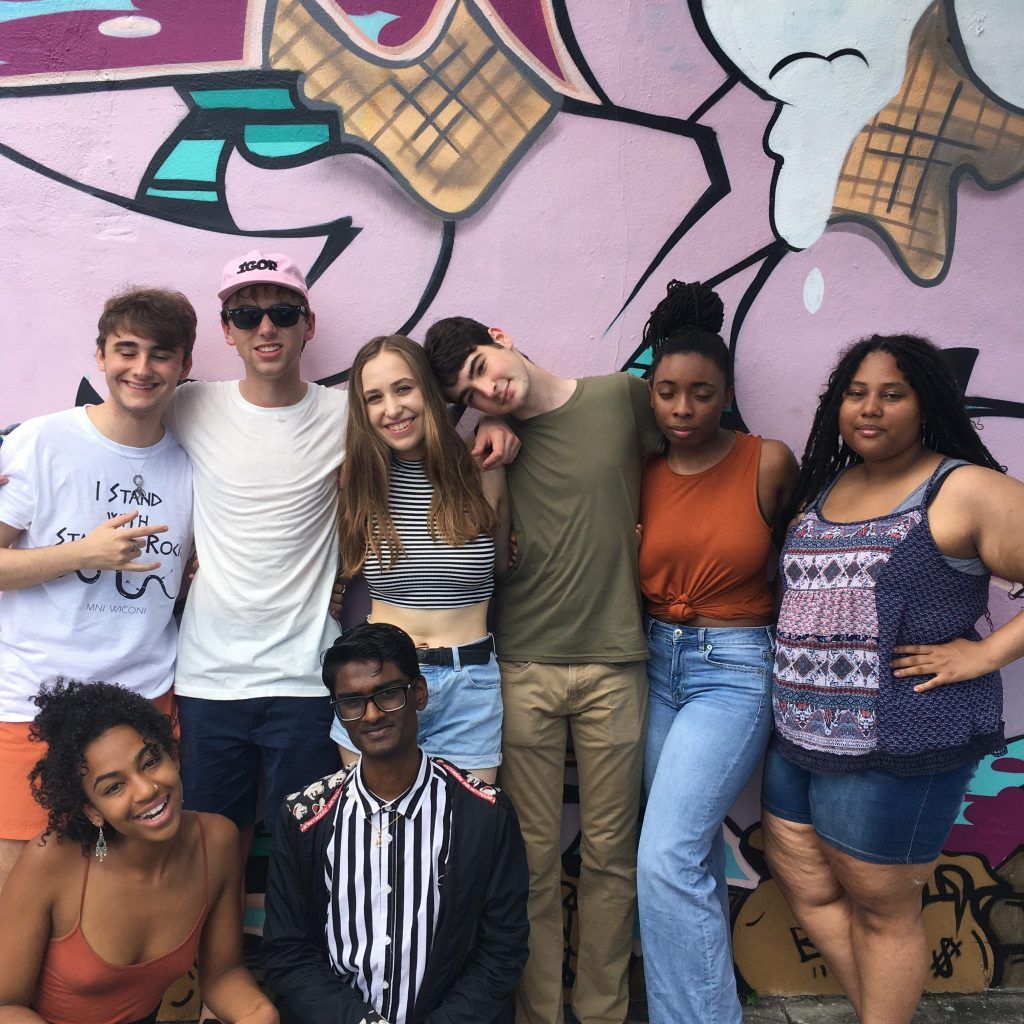The 10-minute interview: Arielle Martinez Cohen on the Youth Climate Summit
By Dawn Stover | July 23, 2019
 Arielle Martinez Cohen (third from left in back row) and friends at the Youth Climate Summit in Miami. Credit: Mark Margolin
Arielle Martinez Cohen (third from left in back row) and friends at the Youth Climate Summit in Miami. Credit: Mark Margolin
Earlier this month, hundreds of young people (and some of their adult allies) met in Miami for a Youth Climate Summit hosted by Zero Hour, the youth-led group that organized the first-ever International Youth Climate March a year ago in Washington and 25 other locations around the world. At this year’s summit, the agenda included tree planting, workshops, and other activities aimed at training and mobilizing young people to advocate for climate justice.
Arielle Martinez Cohen, a 17-year-old singer/songwriter/activist who helped organize the summit, is the Partnerships Director for Zero Hour. She has been working in the music business since she was 9 years old, starting as a backup vocalist and later writing her own songs. Her song “Two Minutes to Midnight” was used in the Bulletin‘s “The Clock: A Brief History.” After the Miami summit, Bulletin contributing editor Dawn Stover spoke with Martinez Cohen for her perspective on the event.
Dawn Stover: For readers who aren’t familiar with it, tell me a little about the Youth Climate Summit. What was the purpose of the summit?
Arielle Martinez Cohen: So, Zero Hour organized the Youth Climate March last summer, but we wanted to do something to mobilize more young people to take action in their communities. When we were deciding where to host the summit, we… You know, Miami is going to be under water pretty soon. It’s already flooding a lot and there are a lot of hurricanes and other natural disasters happening. And when talking to our partners, I also found out that there’s not a lot of engagement from young people in the Miami area.
DS: Why do you think that is?
AMC: I’m not sure. It’s really interesting. I mean, it might be because it’s a spread-out city. I’m not exactly sure. The partners that I was talking to were just saying that young people don’t come out. And we actually went to one of the protests over there before the summit, and there were only about 20 young people at the protest.
DS: When you say partners, are these other organizations?
AMC: Yeah, we partnered with different nongovernmental organizations and nonprofits, and some companies that are eco-friendly that sponsored the summit. So we have partners like Greenpeace, the Sunrise Movement, Veggie Mijas, 350.org, and the Sierra Club. And then we also were sponsored by Patagonia and Burt’s Bees and a bunch of other foundations and companies.
DS: Tell me about the events that were part of it.
AMC: We basically just wanted to train young people to have the skills they need in order to be effective activists. And so we hosted workshops like one on vegan cooking and how to go vegan on a budget, because it can be hard for young people to go vegan, especially when they’re dependent on their parents. We hosted a workshop on how to lobby effectively in local and national government. We hosted another workshop on how to use social media effectively and how to create a movement using social media. We hosted a workshop on how to tell your climate story.
DS: So it was more about training people than about protesting at the summit?
AMC: Well, we kind of saw the summit as an action itself. While we weren’t protesting and making our voices heard on the streets, we were making our voices heard in the conference room. We are mobilizing other people to go out and take action in our communities and be effective in that way.
DS: Can you give me an idea of about how many people came and what sort of people they were?
AMC: We had 350 people who came to the summit. We had about 900 sign-ups, so not as many people came as we were expecting, but we were still really happy with the turnout. It was mostly young people. There were a few adult allies there, ready to learn and see how they can best support the youth movement. But we had people anywhere from age 8 or 10 to college age.
DS: What were the highlights for you personally?
AMC: It was kind of hard to actually experience the summit because I was running around making sure all the speakers and partners were in order for their workshops and all that stuff. But one thing I remember that really stuck with me was at the end of the summit, when people were heading out and some people came up to talk to the team, and a few people came up to me and they were just, like, “You know, I was really burnt out. I didn’t know how to get involved or I didn’t know if I wanted to continue with activism because it is so frustrating, but this really helped reinvigorate me and re-inspire me.” So that was nice to hear after all of our hard work. Just to hear that really encouraged me and gave me hope.
DS: What’s next? Will there be more of these summits?
AMC: We’re all taking a little bit of a break after the summit because, honestly, we’re all kind of burnt out ourselves. But we’re going to regroup, and we are planning to support other organizations and their actions in the future. I know Sunrise has a summit coming up that we’re supporting. As for future actions, we are part of the Youth Coalition that is planning the climate strikes in September, around the UN Climate Action Summit. So, we’re playing a big role in that—specifically, we are helping with the messaging and getting the climate justice message across to people so they understand that it’s more than just about the environment; it’s also about human rights. And after that, we have some other exciting actions that are in the works for Earth Day 2020, which is the 50th anniversary of Earth Day.
DS: What is the ask? I mean, when you’re doing any of these actions to try to raise awareness, are you asking for something specific from the government or other institutions?
AMC: We mostly focus on Just Transition—bringing everybody up and creating new jobs in the transition toward a renewable energy grid. We also focused on the Green New Deal in the past, but we are now shifting our energy away from that and focusing on a just transition. But what our organization mostly focuses on is mobilizing young people. So we have this campaign called Getting to the Roots of Climate Change where we train ambassadors to be able to understand what climate justice is and what a just transition is, and then they’ll go out in the communities and spread more awareness about that and lobby their governments.
DS: The 16-year-old Swedish activist Greta Thunberg spoke to your summit by video link, right?
AMC: Yes, she did.
DS: How was that, and what do you think about her work?
AMC: I think it’s amazing. It was really awesome to hear her, but it was also cool because it wasn’t just her on the webinar. We had other Fridays for Future movement leaders, the people who are organizing strikes across the world, on the webinar as well. It’s really inspiring to hear from her, and just the way she speaks is like she can whisper and everybody in the room listens. It’s amazing. The highlight for me, though, was listening to all the other organizers as well, and hearing the differences between organizing the strikes in the United States versus organizing the strikes in France and Italy and Australia, and hearing their perspective on that.
DS: Do you expect those strikes to continue with the next school year?
AMC: Yes, definitely. I’m also part of the climate strike movement, specifically in Los Angeles, and the goal is just to keep on getting more students, every single strike, to come out and skip school for the climate. We just want to continue building the youth movement because, as we’ve seen from various studies and even how OPEC said that the climate strikes are the greatest threat to oil companies, it is working. So we just want to continue building it.
Together, we make the world safer.
The Bulletin elevates expert voices above the noise. But as an independent nonprofit organization, our operations depend on the support of readers like you. Help us continue to deliver quality journalism that holds leaders accountable. Your support of our work at any level is important. In return, we promise our coverage will be understandable, influential, vigilant, solution-oriented, and fair-minded. Together we can make a difference.
Keywords: Youth Climate Summit, Zero Hour
Topics: Climate Change, Interviews, Voices of Tomorrow














